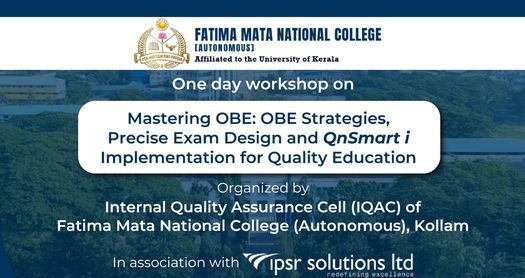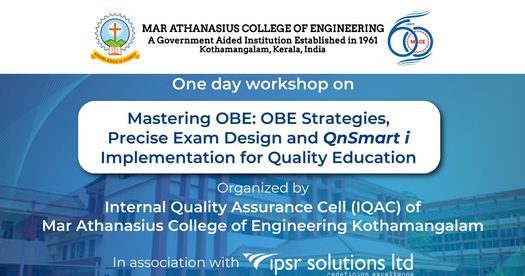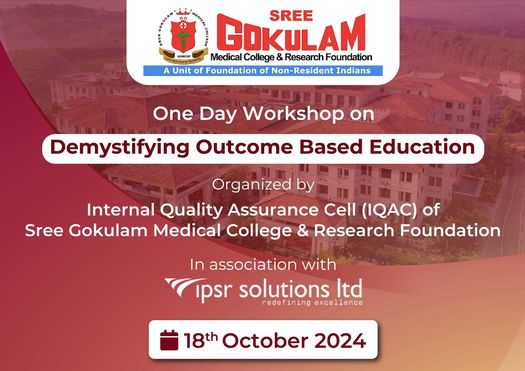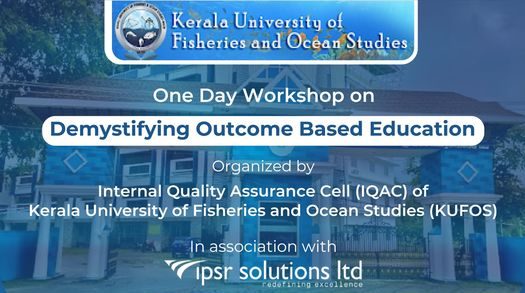
The 2-day OBE Workshop led by Dr Mendus Jacob – CEO, ipsr solutions ltd and Dr Sunil Job – Chief Consultant, ipsr solutions ltd, on 5th and 6th March March 2020 held at SH College, Thevara was a great primer for educators who are trying to get a firm grasp of this new addition to the Indian HEI system.
Attended by 150 educators and administrators from SH College Thevara, the workshop provided a great opportunity for participants to understand the basics of OBE. The participants successfully defined and finalised the Outcomes, planned relevant Teaching-Learning activities, designed the Assessment Strategies, as well as understood the solid concepts for calculating the attainments.
The two-day workshop included sessions on:
The peer discussions during the workshop were lively and the following is a summary of some of the queries that came up.
Problem: Participants completed 3 training sessions on OBE, but still have issues with the concepts, due to different presentations and information given in the different presentations.
Solution: This question was posed during the introductory session. A major issue discussed was the difference between ‘objective’ and ’outcome’. The concept was made clear with relevant examples and the participants had a hands-on session on the formulation of objectives and to identify outcomes related to it.
Problem: Most of the COs that we have defined, are in the way of objectives.
Solution: On the basis of the above discussions, the participants understood that the outcomes that they had formulated needed a revisit to make them observable and measurable.
Question: How many COs are needed for a single course?
Answer: This is a common doubt that arises in almost all workshops. It would be right to say that the outcomes are the end product of a course that is prefixed. So it depends upon the nature of the course. It is not a good practice to fix the number of Course Outcomes to a constant number as the nature and scope of each course vary. It is a good practice to keep the number to an optimal level of 5 to 6.
Problem: We have confusion in PO-PSO mapping and also regarding Bloom’s Taxonomy.
Solution: Few doubts were raised regarding Bloom’s Taxonomy and the need for selection of action verbs on the lines of Bloom’s Taxonomy. The various levels of learning according to the Blooms Taxonomy classification were detailed with relevant examples. Appropriate action verbs relevant to different levels were shared and the necessity for the selection of action verbs from this list was explained with justification.
Problem: Faculty members handling different courses like Film, Literature, and Sociology expressed a problem in identification of the verbs appropriate for their discipline from the levels of Cognitive Domain.
Solution: Teachers from Arts, Fine Arts and Literature had difficulty in identifying verbs from the Cognitive domain, like what is done in the science disciplines. They remarked that the major thrust of the discipline is on the Affective domain specification. This difficulty was rectified by explaining that the cognitive domain and affective domains do not exist in distinct compartments; but are linked. They were also helped in identifying the connecting verbs of these domains to fix the issues.
Problem: Does the word ‘Appreciation’ come under the cognitive domain? How does one formulate outcomes at this level?
Solution: From the above explanation, the teachers identified the appropriate verbs that could be applied in this situation.
Problem: A participant from the Social Sciences Department asked whether they could write an outcome as ‘Behaviour Change” and how it could be evaluated through an activity.
Solution: Learning is a process of bringing out some desirable ‘Behaviour Change’ in the pupil. The outcome stated in OBE should be the end behaviour that the student actualizes through the process. The assessment practices that OBE suggests should clearly assess and evaluate these outcomes in a reliable and valid manner. Exact issues were discussed and the faculty were able to comprehend the solutions for them.
Problem: A participant from Humanities expressed difficulty on how to evaluate “reading habits” and “effective citizenship”?
Solution: The forum discussed various activities that could be effectively adopted in actualizing and assessment of these outcomes.
Problem: The participants expressed the necessity for a revisit of POs and PSOs. Also, the management has given autonomy to the teachers for the improvisation of the predefined outcomes,
Solution: On the lines of the awareness gained on OBE, there was a session on revisiting the Outcomes and the participants suggested a need for restructuring of the same and the process was done on the next day of the workshop.
Problem: The Principal asked about the possibility of handling the calculation of outcomes with the help of Excel.
Solution: A detailed session on calculating the outcome was given. The participants understood the great effort that is required in handling assessment activities and calculating the Outcomes. In response to the Principal’s opinion on whether to have the calculation done by the respective teachers with the help of Excel, the participants strongly objected and requested for automation of the process, for effective implementation. The participants also expressed their concern that without automation they won’t be able to show justice to the major curricular activities.
Problem: IQAC Coordinator requested for a demo on how to map questions to outcomes.
Solution: As per the request of the management and IQAC team, a demo of QnSmart, the automated question paper generation software by IPSR, was conducted. The participants understood how the tool effectively helps to prepare Question Banks and generate quality question papers, according to specifications for OBE.
Question: Is PSO for one semester or for all semesters?
Answer: PSOs are Program Specific Outcomes which are not addressed by general PO formulated by the institution. It is calculated only after completion of the entire program. So it is not semester specific, it is Program specific. Hence the entire courses of the entire semesters that are relevant to the PSOs should be mapped to the respective PSOs.
Question: Is there any specification on the number of PSOs for a Programme?
Answer: The number of PSOs depends on the nature of the programme. It may be a good practice to optimise the number to (2 to 4) if possible.
Problem: Faculty members discussed their difficulties and the tediousness in the estimation of the outcomes.
Solution: Participants on understanding the procedure of Assessment, reaffirmed the need for automation of the assessment process.
Question: How to map assignments, vivas to POs and PSOs?
Answer: Assignments and Viva are Course-specific activities. For a valid mapping of these activities, evaluation rubrics should be created. Each criterion relevant to the respective COs should be mapped considering the mapping strength. A sample rubric for an assignment was discussed in the forum.
Problem: The College has a ‘Service Learnings Activity’ with 2 credits, which is mandatory for all students. What is its impact on OBE?
Solution: It could be included in the OBE assessment. The procedure for incorporating it in the assessment was discussed.
Problem: How do we deal with multiple assignments that have multiple criteria?
Solution: The forum discussed standardization procedures in dealing with such cases.
Problem: How should assignments, given by multiple teachers on the same course be assessed?
Solution: The forum discussed roles and responsibilities and standardization and scaling techniques for handling the situation.
Previous workshops conducted by the IPSR AcademiX team
The 2-day OBE Workshop led by Dr Mendus Jacob – CEO, ipsr solutions ltd and Dr Sunil Job – Chief Consultant, ipsr solutions ltd, on 5th and 6th March March 2020 held at SH College, Thevara was a great primer for educators who are trying to get a firm grasp of this new addition to the Indian HEI system.
Attended by 150 educators and administrators from SH College Thevara, the workshop provided a great opportunity for participants to understand the basics of OBE. The participants successfully defined and finalised the Outcomes, planned relevant Teaching-Learning activities, designed the Assessment Strategies, as well as understood the solid concepts for calculating the attainments.
The two-day workshop included sessions on:
The peer discussions during the workshop were lively and the following is a summary of some of the queries that came up.
Discussion on Day 1
Problem: Participants completed 3 training sessions on OBE, but still have issues with the concepts, due to different presentations and information given in the different presentations.
Solution: This question was posed during the introductory session. A major issue discussed was the difference between ‘objective’ and ’outcome’. The concept was made clear with relevant examples and the participants had a hands-on session on the formulation of objectives and to identify outcomes related to it.
Problem: Most of the COs that we have defined, are in the way of objectives.
Solution: On the basis of the above discussions, the participants understood that the outcomes that they had formulated needed a revisit to make them observable and measurable.
Question: How many COs are needed for a single course?
Answer: This is a common doubt that arises in almost all workshops. It would be right to say that the outcomes are the end product of a course that is prefixed. So it depends upon the nature of the course. It is not a good practice to fix the number of Course Outcomes to a constant number as the nature and scope of each course vary. It is a good practice to keep the number to an optimal level of 5 to 6.
Problem: We have confusion in PO-PSO mapping and also regarding Bloom’s Taxonomy.
Solution: Few doubts were raised regarding Bloom’s Taxonomy and the need for selection of action verbs on the lines of Bloom’s Taxonomy. The various levels of learning according to the Blooms Taxonomy classification were detailed with relevant examples. Appropriate action verbs relevant to different levels were shared and the necessity for the selection of action verbs from this list was explained with justification.
Problem: Faculty members handling different courses like Film, Literature, and Sociology expressed a problem in identification of the verbs appropriate for their discipline from the levels of Cognitive Domain.
Solution: Teachers from Arts, Fine Arts and Literature had difficulty in identifying verbs from the Cognitive domain, like what is done in the science disciplines. They remarked that the major thrust of the discipline is on the Affective domain specification. This difficulty was rectified by explaining that the cognitive domain and affective domains do not exist in distinct compartments; but are linked. They were also helped in identifying the connecting verbs of these domains to fix the issues.
Problem: Does the word ‘Appreciation’ come under the cognitive domain? How does one formulate outcomes at this level?
Solution: From the above explanation, the teachers identified the appropriate verbs that could be applied in this situation.
Problem: A participant from the Social Sciences Department asked whether they could write an outcome as ‘Behaviour Change” and how it could be evaluated through an activity.
Solution: Learning is a process of bringing out some desirable ‘Behaviour Change’ in the pupil. The outcome stated in OBE should be the end behaviour that the student actualizes through the process. The assessment practices that OBE suggests should clearly assess and evaluate these outcomes in a reliable and valid manner. Exact issues were discussed and the faculty were able to comprehend the solutions for them.
Problem: A participant from Humanities expressed difficulty on how to evaluate “reading habits” and “effective citizenship”?
Solution: The forum discussed various activities that could be effectively adopted in actualizing and assessment of these outcomes.
Problem: The participants expressed the necessity for a revisit of POs and PSOs. Also, the management has given autonomy to the teachers for the improvisation of the predefined outcomes,
Solution: On the lines of the awareness gained on OBE, there was a session on revisiting the Outcomes and the participants suggested a need for restructuring of the same and the process was done on the next day of the workshop.
Problem: The Principal asked about the possibility of handling the calculation of outcomes with the help of Excel.
Solution: A detailed session on calculating the outcome was given. The participants understood the great effort that is required in handling assessment activities and calculating the Outcomes. In response to the Principal’s opinion on whether to have the calculation done by the respective teachers with the help of Excel, the participants strongly objected and requested for automation of the process, for effective implementation. The participants also expressed their concern that without automation they won’t be able to show justice to the major curricular activities.
Problem: IQAC Coordinator requested for a demo on how to map questions to outcomes.
Solution: As per the request of the management and IQAC team, a demo of QnSmart, the automated question paper generation software by IPSR, was conducted. The participants understood how the tool effectively helps to prepare Question Banks and generate quality question papers, according to specifications for OBE.
Question: Is PSO for one semester or for all semesters?
Answer: PSOs are Program Specific Outcomes which are not addressed by general PO formulated by the institution. It is calculated only after completion of the entire program. So it is not semester specific, it is Program specific. Hence the entire courses of the entire semesters that are relevant to the PSOs should be mapped to the respective PSOs.
Question: Is there any specification on the number of PSOs for a Programme?
Answer: The number of PSOs depends on the nature of the programme. It may be a good practice to optimise the number to (2 to 4) if possible.
Problem: Faculty members discussed their difficulties and the tediousness in the estimation of the outcomes.
Solution: Participants on understanding the procedure of Assessment, reaffirmed the need for automation of the assessment process.
Question: How to map assignments, vivas to POs and PSOs?
Answer: Assignments and Viva are Course-specific activities. For a valid mapping of these activities, evaluation rubrics should be created. Each criterion relevant to the respective COs should be mapped considering the mapping strength. A sample rubric for an assignment was discussed in the forum.
Problem: The College has a ‘Service Learnings Activity’ with 2 credits, which is mandatory for all students. What is its impact on OBE?
Solution: It could be included in the OBE assessment. The procedure for incorporating it in the assessment was discussed.
Problem: How do we deal with multiple assignments that have multiple criteria?
Solution: The forum discussed standardization procedures in dealing with such cases.
Problem: How should assignments, given by multiple teachers on the same course be assessed?
Solution: The forum discussed roles and responsibilities and standardization and scaling techniques for handling the situation.
Join us for FREE to get instant email updates!

The Internal Quality Assurance Cell (IQAC) of Fatima Mata National […]

Mar Athanasius College of Engineering, Kothamangalam, hosted an insightful and […]

Sree Gokulam Medical College & Research Foundation, in collaboration with […]

The Internal Quality Assurance Cell (IQAC) of the Kerala University […]

The Internal Quality Assurance Cell (IQAC) of St. Joseph’s College […]
Leave A Comment